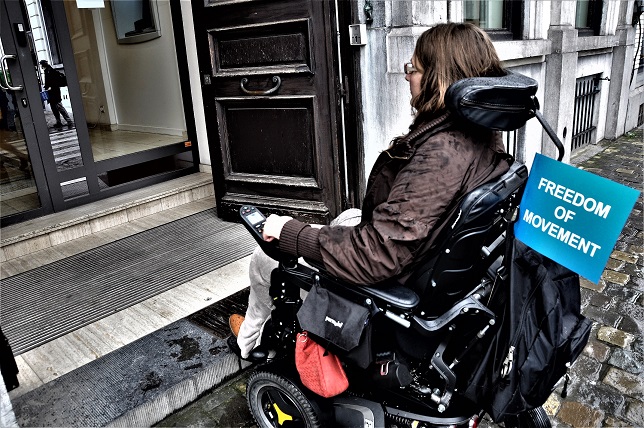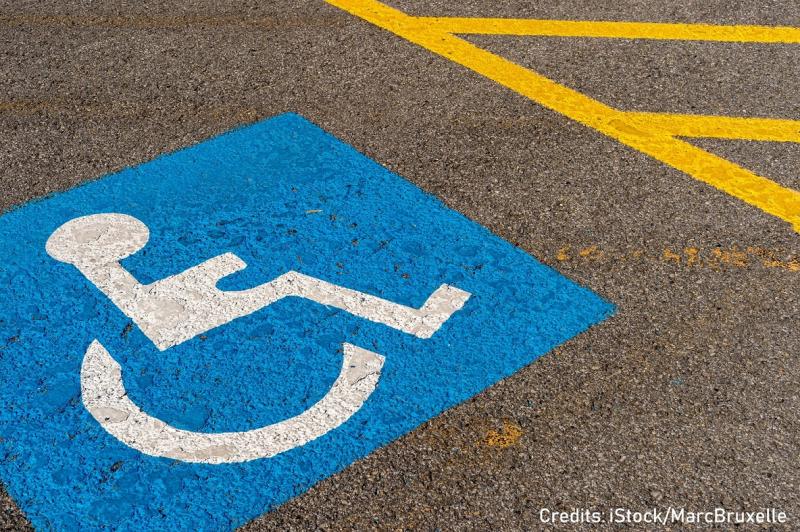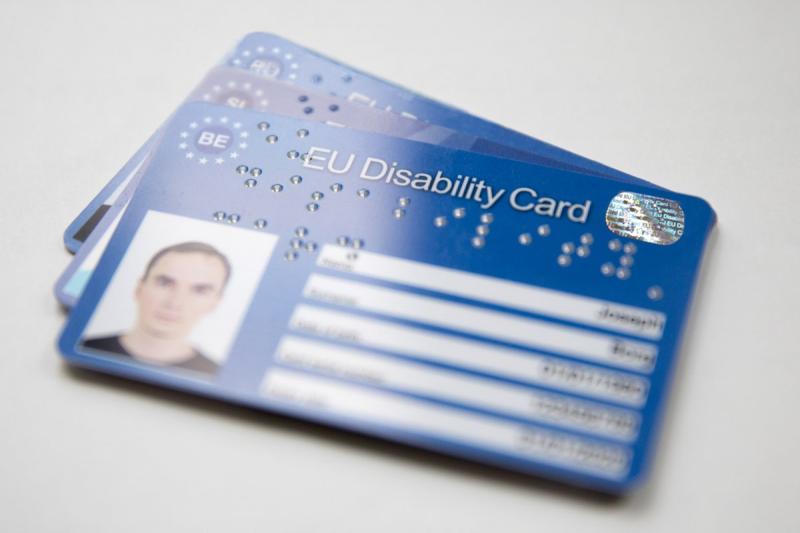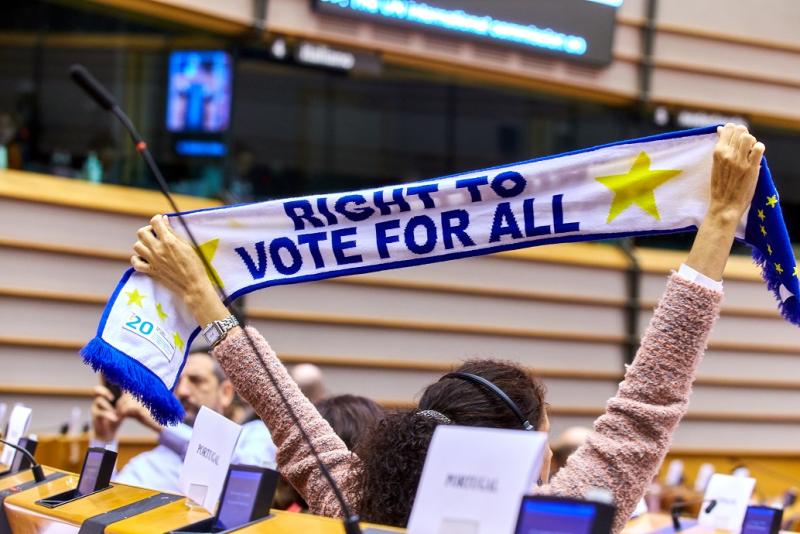German | French
“The EU? They are only bureaucrats. Why should I vote for them?” A question (statement?) that we are used to hearing again and again.
It is not true. The EU has a big impact on the lives of persons with disabilities. It has several initiatives that have directly improved, or that have led EU countries to improve, the lives of persons with disabilities.
The next elections for the European Parliament will take place 23-26 May (depending on the country). Here are ten reasons on why you should go and vote (if you are not one of the 800,000 citizens currently unable to vote due to discriminatory laws):
1. Because the EU fights for accessibility
EU institutions have been working hard to assure that both the physical and virtual world are more accessible for persons with disabilities. Public transport and public websites, among others, have become more accessible (for example, it obliges airports to provide assistance to persons with disabilities. It also obliges EU countries to make all new train stations accessible). The EU also recently agreed on a law that will make many products and services more accessible to us!
These laws, some of which then need to be put by EU counties into their national laws, have not only improved accessibility throughout the EU but also inspired some countries to go the extra mile.
Important to know: The laws the EU passes are “minimum standards”. This means that (unlike some people think) an EU law cannot reduce the rights you already have. For example, the EU obliges countries to make all new and refurbished train stations accessible, but of course Member States can also do more than that and include old stations in the law.
2. Because the EU protects you at work
In 2000, the EU passed a law that prohibits discrimination at work. This means that we are protected against discrimination when we work or have work-related training. It also means that employers need to adapt the work place to employees with disabilities.
While the situation is far from perfect, it is because of this law that you can go to court or ask the support of an anti-discrimination institution if, for example, you were discriminated when applying for a job, when you are fired from your job or when your employer refuses to grant you the adaptions needed to do your work.
3. Because EU money supports the inclusion of persons with disabilities
EU money helped Selina find her dream job in Austria. EU money funded Nicolas participation in a project between France and Spain, on the right to vote for persons with disabilities. It supports Greek persons with disabilities in living independently. It builds hospitals in Portugal. It is used to renovate houses and make them more accessible. Many Europeans are unknowingly supported by EU funds. In fact, despite their complaints, even the richest countries rely on EU money to support persons with fewer opportunities and at risk of exclusion.
4. Because you can use your parking card in all EU countries
If you have a disability, you might be entitled to the EU parking card. This parking card is recognised in all EU countries and allows you to park in reserved spots all throughout the EU. This means that if you decide to travel or live in another EU country, you don’t need to apply for a disability parking card time and time again! A true example of “bureaucrats” reducing bureaucracy.
You can get your parking card from the relevant authority in the country you live in.
5. Because you can live in another country and still receive (some) social security benefits.
If you are an EU citizen, you can move to another EU country and still be entitle some social security benefits. For example, you can move to another EU country and keep your original old age pension. For disability benefits, it’s more complicated: you are entitled to disability allowances on the same level as a national of that country, but you have to apply for them and pass a new disability assessment process.
This is because, while the EU coordinates social security systems, some EU countries are still not totally on board: for example, a few weeks ago they denied new rules that would provide a more integrated system! This is why you need to vote and to vote for politicians that care about freedom of movement for persons with disabilities!
The positive impact of this assurance can sadly be seen by the negative impact that losing it brings: EU citizens living in the UK are in a limbo, not sure if they can receive their contributions after Brexit.
6. Because you can go to the hospital in another EU country
If you have an accident or are ill when visiting another EU country, you can go to the hospital or doctor under the same conditions as a national from that country, thanks to the European Health Insurance Card. That way, you don’t have to cut your travel short due to unaffordable health costs.
Attention: the Card cannot be used for planned treatment abroad.
7. Because of the EU Disability Card
Right now, if you visit another EU country, your disability documents may not be recognized due to a number of practical reasons (different formats, languages, assessment of what constitutes disability). The EU Disability Card, a project that is ongoing in 8 EU countries, will avoid all this by creating a card in the same format everywhere. This means that you can have access to discounted cultural and leisure services: museum, sports facilities, transport, etc.
While the card only exists in 8 EU countries, you can convince the EU to extend it to all the countries. How? By voting in May!
8. Because you can volunteer and/or study abroad – and get support for it.
The well-known ERASMUS+ programme, provides financial support to students that want to spend a semester or year in another EU country. This programme considers the extra needs of persons with disabilities: we are entitled to financial support to cover extra costs, such as the need for personal assistance or accessible housing.
The European Solidarity Corps is a programme that financially supports volunteering opportunities in another EU country.
9. Because 800,000 people want to vote but can’t
If all the above reasons didn’t convince you, maybe this one will: 800,000 Europeans cannot vote due to discriminatory laws that exclude them because of their disability. We need your vote to help change this.
10.Because we can fight better together
Can things improve? Definitely!
The EU can, and should, have more accessibility legislation. It can, and should, channel more funding for persons with disabilities. It can, and should, approve laws that protect us from discrimination in all areas of our life. This is why we need you to go out and vote! By voting, you are telling politicians that you want a Europe that cares about us, and that they should do more to achieve it.
How to vote?
You can check European Parliament’s guide on how to vote in your country. To see for your country, selected your countries main language in the button on the top right of the website.



